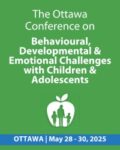
Blog Archives
The Ottawa Conference on Behavioural, Developmental and Emotional Challenges with Children & Adolescents
Live In-Person Conference Complimentary tea, coffee and assorted pastries On-site exhibitors Please note, in-person registration does not include access to the live stream or recorded footage. Live Stream from Home Please allow 3 – 10 business days after…
The Ontario Mental Health Summit
Registration on this page is for live in-person attendance only. To attend virtually please register here: https://webinars.jackhirose.com/product/the-ontario-mental-health-summit/ Live In-Person Conference Complimentary tea, coffee and assorted pastries On-site exhibitors Buffet lunch available for purchase Live Stream from Home This conference will…
Making Sense of Aggression
Important Notice Due to COVID-19 this event is now being offered via Live Streaming. This change has been made to ensure a safe learning environment for all participants. Please note, the days and times have changed. If you are unable…
Making Sense of Aggression
Important Notice Due to COVID-19 this event is now being offered via Live Streaming. This change has been made to ensure a safe learning environment for all participants. Please note, the days and times have changed. If you are unable to…
30 Proven and Effective Self-Regulation and Executive Function Strategies
Important Notice Due to COVID-19 this event is now being offered online. This change has been made to ensure a safe learning environment for all participants. The course is available to watch starting May 6, 2020 until May 1, 2021.…
Over 30 Proven and Effective Brief Interventions for Children and Adolescents with Emotional and Behavioural Problems
Important Notice Due to COVID-19 this event is now being offered online. This change has been made to ensure a safe learning environment for all participants. The course is available to watch anytime from now until March 1, 2021. Participants…
Skills Practice: Practical Interventions with Oppositional, Defiant, & Angry Children, Adolescents & Young Adults in School & Mental Health Settings
Important Notice Due to COVID-19 this event is now being offered online. This change has been made to ensure a safe learning environment for all participants. The course is available to watch starting April 20, 2020 until April 1, 2021.…
What To Do After The Meltdown: Practical Strategies for Prevention, Intervention & Instructional Consequences
When working with a child or adolescent with an Autism Spectrum Disorder, ADHD, or another developmental disorder, meltdowns may occur that may be a result of sensory overload or an inability to self-regulate emotions. This course will provide many practical…
High Functioning Autism: Proven & Practical Interventions for Challenging Behaviours with Children & Adolescents
This intensive, full-day workshop provides proven intervention strategies, essential treatment tools, and behavioural techniques to help you analyze behaviours and actions, identify consequences for behaviours, and teach new skills to children, adolescents and young adults with high-functioning autism (HFA). Walk…
Smart But Scattered: Strengthening Executive Skills in Children and Adolescents
Executive function is a neuropsychological concept referring to the cognitive processes required to plan and direct activities. Skills include task initiation and follow through, working memory, sustained attention, performance monitoring, inhibition of impulses, and goal-directed persistence. While the ground-work for…
The Neuropsychology of Reading & Written Language Disorders: A Framework for Effective Interventions
This workshop will examine reading and written language disorders from a brain-based educational perspective, and classify both dyslexia and dysgraphia into distinct subtypes. There will be a detailed discussion linking each learning disorder’s subtype with scores of evidence-based interventions. Four…
Rescuing the Dysregulated Child: Effective Interventions & Strategies with Children, Adolescents, & Parents
Working with emotionally dysregulated children is an often overwhelming and exhausting endeavour. Many teachers and counsellors feel the pull of being “saviours” for dysregulated children and their parents. How to intervene and steps that can be taken by teachers and…
What Is It About Me You Don’t Like? Practical Classroom Management Strategies that Help Minimize Challenging Behaviours
Quality indicators for an effective classroom include: teacher behaviour (tone of voice, volume, cadence, verbal and nonverbal communication, para verbals), environment (physical structure, schedules, routines, expectations), instruction (boring vs. stimulating, age appropriate vs. non-age appropriate, hands-on), and student behaviour (function…
Is It Disability Behaviour or Just Disruptive Behaviour?
Both educators and parents struggle with what to do with difficult behaviour in the classroom and home. Both are often hesitant to provide consequences when a child with special needs exhibits problem behaviours because they are afraid they will be…
Interventions for Executive Function Difficulties: Changing the Brain to Change Behaviour
This course will help participants gain a deeper understanding of executive functions and how executive functions deficits impact the behaviour and academic production of children and adolescents. Participants will gain state-of-the-art knowledge of how to identify executive function strengths and…
The Neuropsychology of Emotional Disorders: A Framework for Effective Interventions
This workshop will explore the neural architecture of emotional behaviour by examining various brain structures laying the foundation for higher level social skill functioning. Specific biological factors related to the development of social competence and emotional self-regulation will be explored.…
Reaching & Teaching Students with Emotional Disturbance
Students with emotional disturbance provide many challenges for educators. Knowing when to qualify a student for special education, as well as what goals and interventions to put in place, are often areas of concern. In cases where students have aggressive…
Life Skills: Practical Strategies that Work for Students with Severe Cognitive/Developmental Disorders, Autism, CP, & Syndromes
Students labeled as having moderate to significant cognitive/developmental disabilities may appear to have such challenging deficits that their educational needs are perceived as far exceeding their abilities. Their needs may appear so basic (e.g., simple communication skills, appropriate manipulation of…
Over 30 Proven & Effective Brief Interventions for Students with Emotional & Behavioural Problems
Over 30 Proven and Effective Brief Interventions for Student with Emotional and Behavioural Problems will guide you through focused, clear and proven approaches to working with children and youth. Every professional who seeks to fill their toolbox with tested methods will…
Overcoming Anxiety Disorders in School-Age Children
The increasing rate of stress and trauma to children, which includes divorce, family breakdown, violence in society, and the media has produced a “shell shocked” generation suffering from anxiety in many cases. The challenge for educators and clinicians is to…
Powerful and Effective Strategies for Reaching “I Don’t Care” and Disengaged Students
Everyone wants to know how to reach their students who are unmotivated, underperforming and claim to not care about school. This innovative seminar will demonstrate successful strategies you can use in your classroom or school to make positive changes in…
2 Day Skills Practice Workshop
Executive skills are sometimes called “the hidden curriculum.” They are skills such as task initiation, sustained attention, working memory, planning, organization, and goal-directed persistence that are absolutely critical to school success, yet curriculum standards seldom if ever explicitly reference these…
2 Day Skills Practice Workshop
Executive skills are sometimes called “the hidden curriculum.” They are skills such as task initiation, sustained attention, working memory, planning, organization, and goal-directed persistence that are absolutely critical to school success, yet curriculum standards seldom if ever explicitly reference these…
















